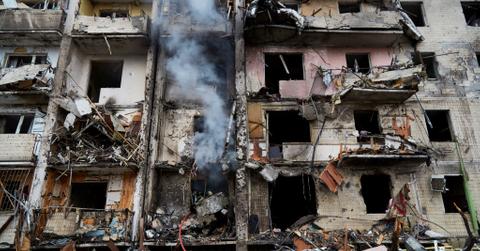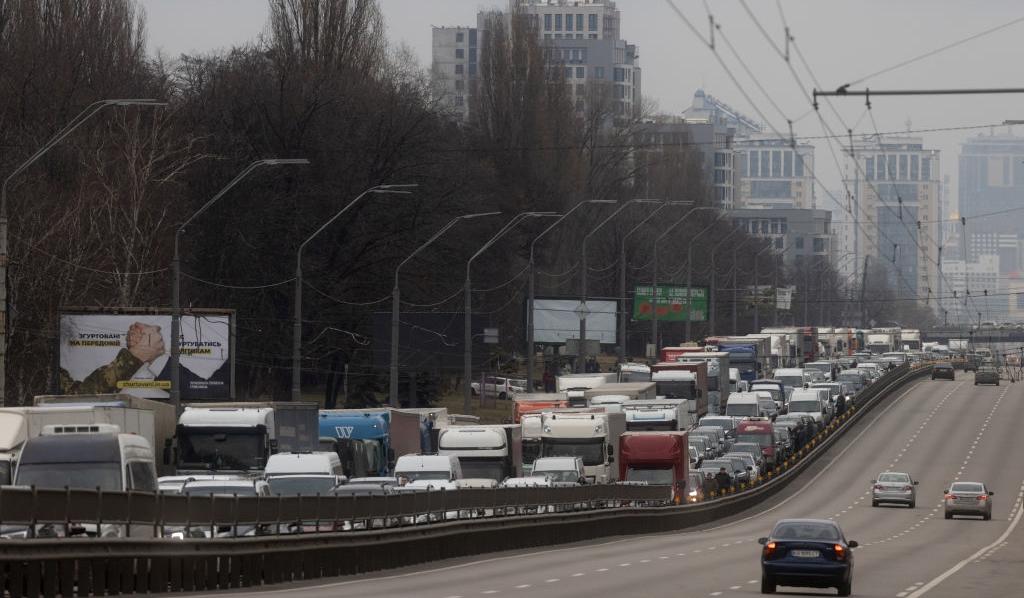Ukraine Stock Market Stops Trading — What It Means for Global Investors
The Ukraine stock market stopped trading when Russia invaded the nation’s capital of Kyiv. What does it mean for global investors?
Feb. 25 2022, Published 11:06 a.m. ET
All stock exchanges in Ukraine stopped trading on Feb. 24 as Russia invaded the nation’s capital of Kyiv. With all securities halted, domestic and global investors alike are feeling the impact of a closed Ukraine stock market.
As Ukrainians flee, fight, and die, the country’s stock market falters—for now. Here’s how the move will reverberate amid a looming war.
Ukrainians flee and the nation takes action.
Ukraine residents, especially those in the capital of Kyiv, have left in droves as Russian armies attack from the land, air, and sea. Ukraine has since banned all men ages 18–60 from leaving the country, which ensures manpower in case a wartime draft is needed.
The U.S., Australia, Japan, and the EU have imposed sanctions against Russia, but it might not be enough. Ukrainian president Volodymyr Zelensky says that it’s time to take a seat at the negotiating table “to stop the people's deaths.”
According to Zelensky, 137 people (including civilians and military personnel) have died in the Russian invasion as of the morning of Feb. 25. Hundreds of people were injured in the first 24 hours after Russia attacked.
Why did Ukraine’s stock exchanges cease trading?
Ukraine’s stock market exchanges, including the Ukrainian Stock Exchange and Kyiv International Stock Exchange, have ceased trading amid the deadly Russia-Ukraine conflict.
According to Ukraine’s state stock market regulator, the nation decided to stop all securities circulation. The only operations that will continue are those necessary for the government—the central bank’s monetary policy and the finance ministry’s public debt servicing.
Other changes to Ukraine’s monetary policy are also taking place. All foreign currency purchases are banned on the interbank market. Meanwhile, the country fixed the exchange rate for its official currency, the hryvnia. Ukraine made the exchange rate flexible again a few years ago after fixing it to combat inflation.
Will Ukraine re-open its stock market?
Right now, Ukraine is on the verge of a homeland war. Its assets suffered dramatically as the invasion began and continued conflict will only increase volatility. The stock market likely won’t reopen until the path has cleared, although it isn't certain when—or if—that will happen.
Russian President Vladimir Putin is fearful of an eastward expansion of NATO (North Atlantic Treaty Organization) and non-existent nuclear weapons, but the war isn't that cut and dry. He wants to take over Ukraine and might even have larger ambitions to re-establish the Soviet Union, which officially fell in 1991.
Ukraine’s stock market closure impacts investors.
While the Ukraine stock market has been open to foreign portfolio investments through Ukrainian-licensed securities traders, the market has remained underdeveloped compared to global standards. In fact, 95 percent of Ukrainian trades are government bonds. China’s Bohai Commodity Exchange owns 49.9 percent of one of Ukraine’s JSC PFTS Stock Exchange.
Despite this, Ukraine instituted a new law in 2021 that would expand the capital markets in line with EU standards. The new infrastructure has been halted along with the Ukraine stock market.
Domestic investors invested in the Ukraine stock market aren't able to liquidate their money. This could be problematic for people with limited savings who want to escape the conflict.
If the U.S. market tells us anything, it’s that most foreign investors likely got out of Ukraine securities before the stock market closure. The S&P 500 fell 7.88 percent in the two weeks ending Feb. 23, and while stocks have whipsawed higher, they’re still in correction territory as panic causes selling.


